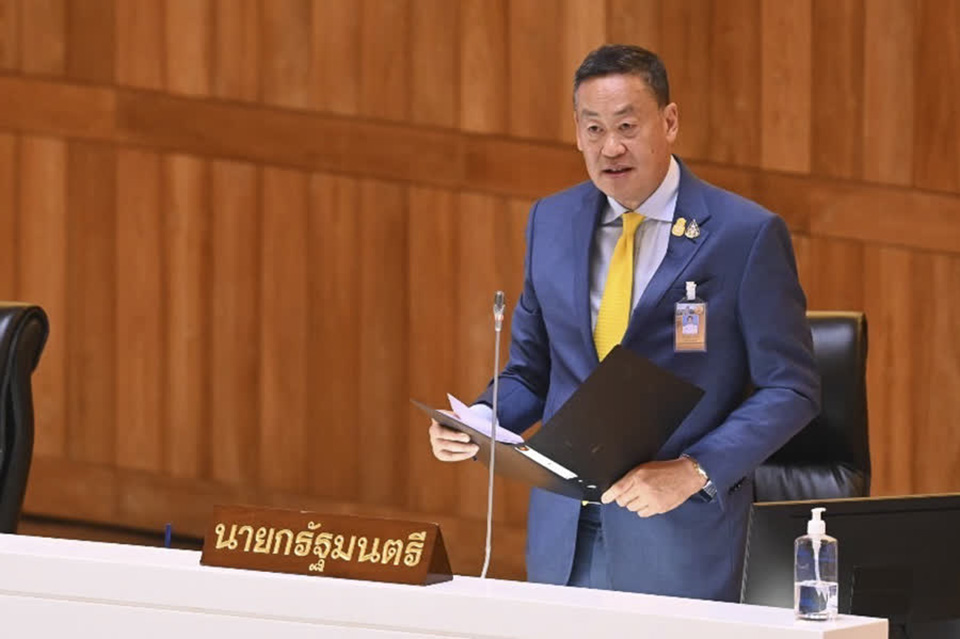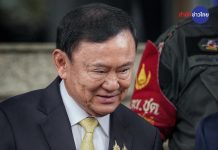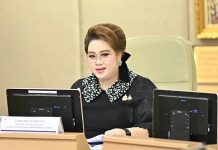
Prime Minister and Minister of Finance Srettha Thavisin led a cabinet meeting to announce policies to the National Assembly, in accordance with Section 162 of the Constitution of the Kingdom of Thailand. The key points are as follows:
– The government aims to communicate its intentions and strategies to create harmony and unity in Thai society. This will lead to collaboration in the development of the economy, society, and governance for the well-being of all Thai citizens.
– Currently, Thailand faces challenges in its economy, society, and politics, exacerbated by the COVID-19 pandemic. The situation is far from stable, and no effective remedies have been implemented. Social and political issues persist without systematic solutions.
– Over 30% of Thailand’s GDP comes from the industrial sector, focused on a narrow range of products. Exports have been in decline for three consecutive quarters, partly due to outdated technology.
– Rapid technological changes are challenging the country’s competitive abilities and will dictate the economic landscape that the government must address.
– Thailand is grappling with a household debt higher than 90% of GDP, a potential economic vulnerability. Additionally, public debt exceeds 61% of GDP, a potentially limiting factor for future fiscal policies. Chronic debt issues exacerbate income inequality, with more than 14 million people below the average income still awaiting state aid.
– The agricultural sector, employing no fewer than 10 million people or one-third of the workforce, contributes only 7% to the GDP. This reflects low income-generating efficiency, causing the average Thai farmer to be in debt by less than 300,000 Baht per household. Currently, the sector also faces challenges from the El Ni?o phenomenon.
-Socially, Thailand is transitioning to a fully aged society, with the elderly population constituting more than 20% of the total population. The challenge of developing human resources to replace this segment is becoming increasingly critical due to a consistent decline in the number of newborns.
– Politically, Thailand is undergoing changes in law, governance, and a lack of respect for diversity, creating a worrying situation for society. Outdated laws contribute to issues of corruption and a lack of faith in the political and administrative systems of the country.
-The aforementioned challenges contribute to poverty, inequality, and hardship for the citizens. Urgent solutions are required to create a better future for all Thais.
—————————-
– This government maintains policies that protect and uphold the monarchy, create correct understanding, and disseminate royal initiatives to promote the nation’s fundamental institution as a mechanism to cultivate virtue and morality in life.
– In the short term, the government’s work framework needs to stimulate expenditure. In the medium and long term, it’s necessary to enhance the capabilities of the citizens.
—————————-
The 10,000 Baht Stipend Policy
This policy will serve as an economic stimulus to rejuvenate the economy comprehensively and circulate throughout all areas down to the grassroots. It encourages consumer spending and creates opportunities for people to engage in professions. Meanwhile, the business sector will expand its investment, resulting in increased production, job creation, and professional opportunities. The government will receive a return in the form of taxes, and importantly, lay the foundation for a digital economy in the country.
—————————-
The Government Urgent Policies
- Debt Relief in Agriculture, Business, and Public Sectors: The government will alleviate the debt burden by offering suitable debt moratoriums for farmers. Additionally, they will assist in reducing financial capital debt for the general public, as well as medium and small-sized businesses. This will give them an opportunity to recover and resume operations, without compromising financial discipline.
- Reducing Energy Costs for the Public: Energy costs are a significant factor in both daily life and economic activities. The government will support effective energy price management, including electricity, cooking gas, and fuel costs, to maintain them at a reasonable level. Plans will be put in place to shift the country’s energy usage structure, focusing on sustainable sourcing and promoting clean energy aligned with economic and environmental development.
- Boosting Tourism Revenue: Tourism is identified as a key driver for short-term revenue generation and job creation. The government will waive visa fees for targeted tourist groups and implement Fast Track VISAs for MICE (Meetings, Incentives, Conferences, and Exhibitions) participants to stimulate tourist spending towards year-end.
- Addressing Constitutional Differences: The aim is to establish a more democratic constitution while upholding the governance model that respects the monarchy as the symbolic head of state. No changes will be made concerning the royal provisions. The government will consult various approaches for a public referendum that emphasizes public participation in drafting rules that are modern, democratic, and universally accepted.
——————–
Mid-Term and Long-Term Government Policies for Improving the Lives of Thai People in Various Dimensions
Strategies for Income Generation
– Opening trade doors to new markets such as the European Union, Middle Eastern countries, India, Africa, and South America while also focusing on existing markets. This involves meeting leaders of various countries to stimulate mutual trade through accelerated trade cooperation agreements like Free Trade Agreements (FTAs) or elevating passport status to enable travel to more countries without requiring visas.
– Furthermore, promoting new economies such as the digital economy and advanced technology industries to enhance the country’s competitive advantage. Extending special economic zones and the economy in all four regions to decentralize economic activities to various provinces.
– Investing in the country’s transportation infrastructure, including road, water, rail, and air, to expand Thailand’s trade and opportunities. This maximizes the benefits of the country’s assets and people and caters to the world’s emerging demand for new products and services.
– Employing the principle of “Market-driven, innovation-supported, and income-enhancing” to support the agricultural sector’s efficiency and productivity. There will be effective water management to meet local demands, and agricultural land will be managed using precision agriculture techniques. Also, providing proper pricing for agricultural products.
– The income generated through the above policies is a crucial factor for dignified living for the Thai people, fair wages, and minimum wages in line with a dignified life. This supports workers in accessing appropriate welfare benefits as the country’s economy expands.
Directions for Creating and Expanding Opportunities for Citizens:
– Utilizing assets to create opportunities for employment, income, and life stability. This includes speeding up land ownership rights, considering turning ownership documents into land deeds, thereby facilitating access to capital. Additionally, promoting ways to generate income from land, such as planting suitable perennial trees according to the area’s nature, and promoting fair and universal carbon credit trading systems.
– Transitioning the government’s role from a rule-driven entity to one that supports and unlocks citizens’ potential. This involves repealing unnecessary laws, such as those related to local liquor, and decentralizing power for more efficient administration at the provincial and local government organization levels. Modern technology should be employed to increase efficiency in service delivery and transform the government into a digital entity.
– Opening doors for foreign labor and experts to benefit the economy and society. This will address the labor needs of both the production and service sectors, as well as the development of technology.
– Building “Soft Power” to elevate the creative thinking of Thai people to generate value, income, and extend arts, culture, and promote local wisdom. Support the concept of “One Family, One Skill” in Soft Power.
– In education, moving forward with reforms and creating a lifelong learning society. Promoting the potentials of students according to their aptitude, generating future income, and distributing educational power to allow students comprehensive access to learning. Providing suitable learning tools is crucial, and the government places emphasis on nationwide teacher quality improvement, including career counselors to help students receive beneficial advice for choosing courses and careers.
Creating a Good Quality of Life, Safety, Dignity, and Pride for the Thai People
– Quality of Life in Terms of Security and Safety: The focus is on ensuring internal and external stability in line with the global context. To do this, the structure of security agencies will be modernized to address the security threats of the 21st century. Efforts will be made to develop the military into a significant force for the nation’s development. Changes will be implemented in the military conscription to a voluntary system, creative training will be provided for military students, a reduction in high-ranking military officers will be adjusted, and the Armed Forces’ strength will be aligned with current and future tasks. Furthermore, the procurement processes under the Ministry of Defence will be modernized and made transparent. Surplus military land will also be repurposed for public benefit. In terms of public safety, the government aims to eliminate the influence of organized crime and drug addiction from Thai society by adopting a “change addicts into patients” policy for effective rehabilitation.
– Quality of Life in Terms of a Clean Environment: The government will take care of resources and the environment that impact public health. Urgent efforts will be made to restore the fertility of soil and water. Problems like environmental degradation and pollution will be addressed to return a clean environment to the people. There will be a rush to solve the annual worsening PM2.5 issue by using economic incentives, both positive and negative, in the agricultural sector, and by collaborating with neighboring countries.
– Quality of Life in Terms of Public Health: The government aims to enhance the effectiveness of the “30 Baht Treats All Diseases” policy. It will become more comprehensive, more convenient, and will reduce the need for people to travel into cities, thereby reducing congestion and the burden on healthcare staff. Medical services can be accessed through a single national ID card, and all the information will be securely connected to a database.
– Quality of Life in Terms of Equality: Regardless of the vulnerable groups, disabled, elderly, ethnic groups, everyone will be honored, dignified, employed, have income, and a better quality of life through “state welfare.” There will also be support for the equality of various gender groups, and the use of a Women’s Role Development Fund will open opportunities for women in communities to access capital for income generation and stable livelihoods.
—————————
– The government will drive the economy, politics, society, and environment with accurate information by fully adopting digital technology. Special focus will be given to cyber threat prevention, media literacy, and equipping the public with digital skills to accelerate national progress.
– At the same time, the government does not neglect its foundational responsibilities in collaboration with the public, such as creating justice in safeguarding citizens’ rights and preventing and eradicating corruption involving the public.
– The government will establish its role on the global stage, emphasizing balanced diplomatic relations with various countries. This will be based on the nation’s interests and maintaining Thailand’s leadership role in the region and sub-region. Collaboration with groups of countries and international economic organizations will be sought to build confidence in Thailand.
————————
– In the next four years, these will be the years where the government lays new foundational structures for the country, anchored by strong and trustworthy legal principles. These will be transparent, verifiable, and in compliance with relevant laws and regulations, while emphasizing public participation in the process.
– In terms of budget management, the government will act with a targeted approach in the aspects of growth, reducing inequality, and maintaining stability. Fiscal discipline will be strictly adhered to, especially regarding the nation’s tax income. Efficiency in tax collection will be improved along with promoting trade, investment, and tourism to generate income for the public. This money will, in turn, feed back into the tax system to fund future policies.
– In conclusion, the government assures the Parliament and the people of Thailand that it will administer the nation with honesty, integrity, and with the collective interests of the public and the country at the forefront. Efforts will be poured into implementing policies to elevate economic, social, and quality-of-life development for the public, providing a better life for everyone and a brighter future for our offspring from now on. (NNT)






